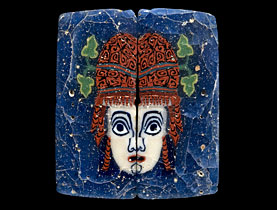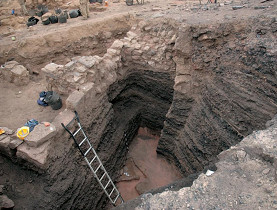From cakes to mosaics

Achille Groppi was a Swiss coffee house owner in Cairo with an eye for both mouth-watering confectionery and sparkling Egyptian antiquities.
For the first time, Groppi’s unique collection – which includes a golden goblet used by King Farouk – is on display at the Antikenmuseum Basel, the city’s leading museum for classical and Egyptian antiquities.
Many of the 160 objects in the “Köstlichkeiten aus Cairo” (Delicacies from Cairo) exhibition have never before been shown in public.
“Between 1920 and 1940 this was the most important private collection in the world – not only for glass but also for Egyptian art,” exhibition curator André Wiese told swissinfo.
It all began in the 1880s when Giacomo Groppi (1863-1958), a young pastry chef and chocolate maker from a humble Lugano family, packed his bags and went in search of his fortune in up-and-coming Egypt.
He opened his first business in Alexandria in 1890 and had soon made enough money to retire in Switzerland, which is what he wanted to do, according to Wiese.
However the financial crash of 1907 wiped out most of his savings, so two years later he opened a new venture in Cairo, near the opera house, under the name “Maison Groppi”. By the outbreak of the First World War this had become a favourite with the British Army.
Income from this, as well as from an ice cream factory and a royally patronised silver service catering business, allowed Groppi to expand and implement his sweet dreams.
Entrepreneur
In 1925 Giacomo and his son Achille (1890-1949) – pronounced ‘asheell’ as in French, the spoken language in Cairo at the time – opened the “J Groppi” shop and coffee house in the middle of Cairo on Soliman Pasha Square, now Midan Talaat Harb.
J Groppi – J for Jacques – soon became a hub for Cairo’s high society, who would sip their cinnamon-infused tea or rose blossom syrup and nibble on fruit and nut chocolates or cream cakes in Art Deco surroundings.
In 1928 Achille, who had studied economics in Switzerland but returned to Egypt to help his aging father, went to America in search of new ideas. He came back with two of his best: the first mass production of ice cream in Egypt and a chain of cheaper pastry and coffee shops “à l’Américaine” for the less flush members of Egyptian society.
“Giacomo was the real pâtissier. Achille was more the entrepreneur,” Emilio Bianchi, Achille Groppi’s great-nephew, told swissinfo.
Political upheavals
The 1920s and 1930s were definitely the Groppi golden days. The Second World War didn’t disrupt business too badly – British officers still had to have cream teas – but in the 1950s the coffee house got caught up in the Egyptian Revolution, when Gamal Abdel Nasser moved to abolish the constitutional monarchy and establish a republic.
On January 26, 1952 – “Black Saturday” – riots broke out in Cairo targeting British interests and businesses. All Groppi’s windows were shattered, but it escaped more serious damage.
In a second lucky escape, on March 20, 1954 a bomb was placed, reportedly on Nasser’s orders, actually inside the coffee house. While the detonation caused widespread panic, no one was hurt.
The Groppi experience came to an end in 1981 when descendants decided to close the business for financial reasons, with the ice cream section being sold to Swiss multinational Nestlé. But Maison Groppi and parts of the Art Deco interior of the café have been preserved.
Legacy
Achille Groppi’s legacy lives on, however, in the form of his unique collection of ancient Egyptian artefacts, many of mosaic glass from the Ptolemaic Period (330-30BC). Amulets, scarabs and bronze statues also caught his eye.
Groppi started collecting in the early 1920s – “just for pleasure”, according to Bianchi. “But at some point he realised it was also a business that he could in future use for his family,” he said.
“Achille had very strong contacts with famous Egyptologists,” Wiese said. “Unfortunately a significant part of the collection was sold by Christie’s in London in 1993. No one knew it was Groppi’s collection because it was published under a pseudonym.”
Although some important pieces were indeed auctioned as the “Per-Neb Collection”, the Groppi collection is still an outstanding assortment of Egyptian small objects. Many originals are on display at the Antikenmuseum Basel, alongside informative texts and blown-up historical photos.
Achille Groppi died childless in 1949 and bequeathed his collection to his sister, who divided it among her three sons.
“It wasn’t that hard to organise the exhibition as the three [families] all live in Lugano,” Wiese said. “We visited them and chose what we would like to display – they were very excited and cooperative.”
Although the collection comprises many valuable artefacts, the highlight for Wiese is the mosaic glass.
“Some collectors, mainly from the Near East, pay very high prices for such things. Such small objects could easily reach SFr50,000 ($43,000), with their lovely Greek, Egyptian or oriental motifs.”
swissinfo, Thomas Stephens
„Köstlichkeiten aus Cairo” runs at the Antikenmuseum Basel until May 3, 2009.
The exhibition was organised jointly with the Museum August Kestner, Hannover, where it ran until May 4, 2008.

In compliance with the JTI standards
More: SWI swissinfo.ch certified by the Journalism Trust Initiative












You can find an overview of ongoing debates with our journalists here . Please join us!
If you want to start a conversation about a topic raised in this article or want to report factual errors, email us at english@swissinfo.ch.